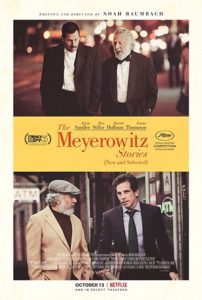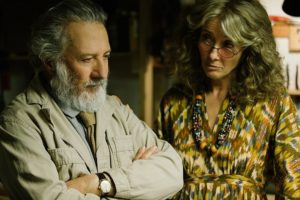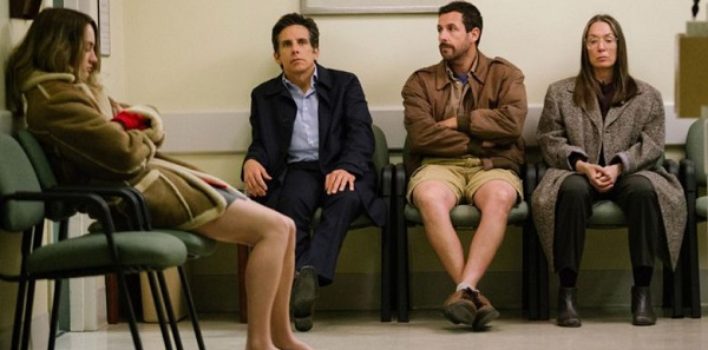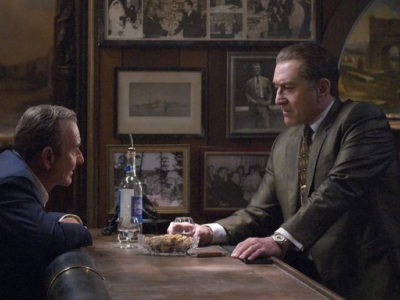Review| The Meyerowitz Stories (New and Selected)
 Family is so instrumental in shaping who we are. The Meyerowitz Stories (New and Selected), holds that reality under a microscope. The all-too-common fight against becoming like our parents, striving to live up to their expectations, and comparing ourselves to our siblings, is a subject in which Director Noah Baumbach has become somewhat of an expert. This film’s predecessors: Mistress America and the deeply personal The Squid and the Whale are also explorations of the impact that family life can have on an individual.
Family is so instrumental in shaping who we are. The Meyerowitz Stories (New and Selected), holds that reality under a microscope. The all-too-common fight against becoming like our parents, striving to live up to their expectations, and comparing ourselves to our siblings, is a subject in which Director Noah Baumbach has become somewhat of an expert. This film’s predecessors: Mistress America and the deeply personal The Squid and the Whale are also explorations of the impact that family life can have on an individual.
The raw performances from Adam Sandler, Dustin Hoffman, Emma Thompson, Ben Stiller, and Elizabeth Marvel, along with a superb screenplay makes this Baumbach’s most beautifully executed and exhaustive treatment of familial themes to date. The pain, dysfunction, and reconciliation experienced by these characters is explored at length in this dramedy which was just released on Netflix.
Harold Meyerowitz (Dustin Hoffman) is a washed up artist who is still pining for the old days. It’s all he can talk about. Even when his son, Danny (Adam Sandler), comes to him in a time of need, Harold can’t seem to see past his own insecurities and his insatiable desire for affirmation to make himself available for his kids’ emotional needs. He’s barely phased by his alcoholic wife, Maureen (Emma Thompson). Even though it’s his fourth marriage, there is no acknowledgement of his narcissism.
Danny (Sandler) is the unhinged one. With a marriage that’s falling apart and regrets over not pursuing a career in music, his constant road rage and angry outbursts make him the least emotionally stable one of the bunch. Jean (Marvel) is healing from wounds of her own, but she’s probably the most well-adjusted. She’s content to work a simple office job and offer support to her family when needed. Matthew ( Stiller) is the successful, yet detached one – working in finance and making a small fortune, yet dropping the ball at home – struggling to develop a relationship with his one son.
When Harold suffers a head injury, the family rallies around him, spastically trying to understand the potential outcomes of his condition, while also trying to follow through on Harold’s commitment to an art show that is scheduled for just a few short days following the incident. In a time of crisis the siblings are given the opportunity to evaluate their true feelings for their father and for each other. Baumbach does a great job juggling the humor that he’s able to draw from each actor’s exceptional performance, but not at the expense of downplaying the seriousness of the struggle each character is walking through.
 Harold is the cornerstone of the family. He has set the tone for how each member of the family interacts with and treats each other, and in each subsequent marriage he has left emotional wreckage along the way. Harold’s actions point to the concept of “generational sin” – a theme that is discussed fairly frequently in the Old Testament. The way that Harold behaves trickles down to the rest of his family, especially his sons, and both Danny and Matthew find themselves responding to life’s circumstances in many of the same ways as their father.
Harold is the cornerstone of the family. He has set the tone for how each member of the family interacts with and treats each other, and in each subsequent marriage he has left emotional wreckage along the way. Harold’s actions point to the concept of “generational sin” – a theme that is discussed fairly frequently in the Old Testament. The way that Harold behaves trickles down to the rest of his family, especially his sons, and both Danny and Matthew find themselves responding to life’s circumstances in many of the same ways as their father.
Harold Meyerowitz’s life is a case study on what can happen when pervasive sins aren’t dealt with. Harold was always living for himself. It didn’t matter which family member was standing in the way. He spent a whole lifetime bowling them over to get what he wanted. What he leaves behind is a son who can barely function as an adult, a daughter who has to carry the emotional wounds of a father who didn’t protect her in her most vulnerable moments, and another son who lives to prove himself at the expense of his own family.
It’s not all hopeless though. For The Meyerowtiz’s, or for your family. Everyone is offered a new start through the power of reconciliation through Jesus Christ. Through Jesus’ work on the cross we are given an opportunity to repent of the pervasive sins in our life so that God the Father will no longer “visit the iniquity of the fathers on the children to the third and fourth generation.” (Exodus 20:5). We aren’t bound to the sins of our parents, and though it’s subtle, this film reinforces this notion.
 Danny is able, in some small way, to break away from the unhealthy rhythms he had established with his father. Jean is able to express many of her frustrations and pain and see her brother’s come to her defense in a way her father didn’t. And Matthew is able to come to the realization that he can still take good away from the marks his family has left.
Danny is able, in some small way, to break away from the unhealthy rhythms he had established with his father. Jean is able to express many of her frustrations and pain and see her brother’s come to her defense in a way her father didn’t. And Matthew is able to come to the realization that he can still take good away from the marks his family has left.
This is the message we are left with as an audience. Though it’s painful to watch at times, this film portrays a real family just trying to figure out how to love each other in a broken world. No matter our upbringing and the level of dysfunction we experience in adolescence, The Meyerowitz Stories shows us how family can be the problem, and sometimes the solution too. Whether we’re working through issues with our family of origin or our family in Christ, no one has it all figured out, but we can clumsily and imperfectly love our family as we try to.







